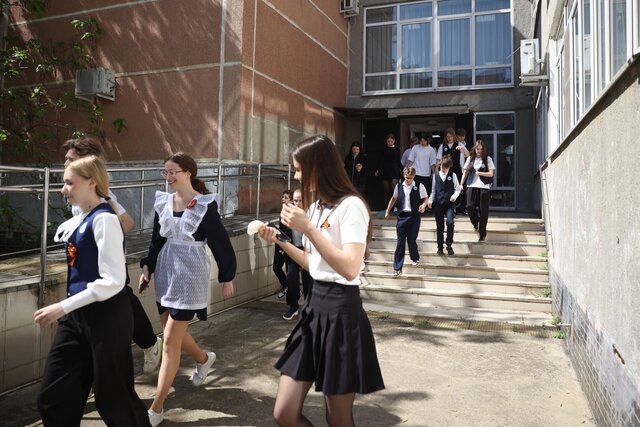‘The geopolitical situation has changed’. Russian authorities move to fully ban Ukrainian language from schools in occupied territories
Manage episode 491018198 series 3381925

At the start of the 2025–2026 school year, Russia plans to impose a full ban on Ukrainian language education in schools across the territories it occupies in Ukraine. In reality, occupation authorities have already spent years dismantling such instruction and punishing parents who tried to enroll their children in online Ukrainian classes. Journalists from BBC News Ukrainian detailed what the new policy involves and what the Russian authorities’ previous efforts to suppress Ukrainian language education have looked like. Meduza shares a translation of their report.
Russia’s Education Ministry plans to fully eliminate Ukrainian language instruction from schools in Ukraine’s occupied territories, according to a draft order published on the ministry’s website and reported by Kommersant this week. Beginning with the upcoming academic year, Ukrainian will be removed from the general education curriculum in elementary and secondary schools.
The draft order states that during the 2023–2024 school year, Ukrainian was offered as a “native language” subject only in the occupied areas of Ukraine’s Zaporizhzhia and Kherson regions. However, as of September 1, 2023, studying Ukrainian in these regions was no longer mandatory; parents were given a choice between Russian and Ukrainian as the designated “native language” for their children’s instruction.
In annexed Crimea and the occupied parts of the Donetsk and Luhansk regions, Ukrainian has long been available only upon parental request. Under the new order, even that option is set to be removed: in the coming school year, students in these territories will no longer be able to study Ukrainian at all.
The official justification cited in the draft is “changes in the geopolitical situation in the world.” If adopted, the order will take effect on September 1.
How Russia steadily drove out Ukrainian language education
Moscow’s efforts to eliminate Ukrainian from schools in the occupied territories have been ongoing for years. In 2023, the Ukrainian outlet Detector Media, citing Russia’s state-run RIA Novosti, reported that only 46 schoolchildren in the occupied part of the Zaporizhzhia region opted to study Ukrainian during the 2023–2024 academic year.
Russian educational standards were introduced in occupied areas shortly after Russia’s full-scale invasion, starting on September 1, 2022. Despite this, many students continued their Ukrainian studies online, often in secret.
Life under Russian occupation
A 2024 report by Human Rights Watch found that the Russian government and Russian-installed occupation authorities had systematically cracked down on families for continuing Ukrainian-language classes.
“Russian authorities and their proxies punished distance learning or teaching of the Ukrainian curriculum and threatened parents with fines, loss of custody of their children, and detention if they did not enroll their children in ‘Russian’ schools, or if their children studied the Ukrainian curriculum remotely,” the report said.
One young woman who fled the occupied part of the Kherson region just weeks ago told the BBC that she studied remotely the entire time from 2022 until her departure. “They pressured us to enroll in a Russian school,” she recalled. “But we showed that I’d already finished ninth grade, so I didn’t have to go.”
In reality, this student continued her Ukrainian education online and completed 11th grade before leaving the region to take Ukraine’s university admissions exams in Ukrainian government-controlled territory.
What’s replacing Ukrainian classes?
As they phase out Ukrainian, the Russian authorities are simultaneously expanding what they call an “agrotechnology track” in secondary schools.
“The introduction of an agrotechnology focus is part of a broader effort to develop agricultural and technological education, in accordance with a directive from the President of the Russian Federation dated April 18, 2024, […] which calls for the creation of specialized agrotechnology classes in general education schools tailored to regional needs,” the draft order states.
Pavlo Lysianskyi, a Ukrainian human rights activist and the director of the Institute for Strategic Studies and Security, says the erasure of Ukrainian in the Donetsk and Luhansk regions began long before the 2022 invasion.
“The so-called ‘State Security Ministry’ started pressuring schools and parent committees to sign statements refusing to teach Ukrainian. Some schools tried to resist. But by 2017, the entire education system there had shifted to Russian standards. OSCE observers were told that parents themselves were declining [to have their children study Ukrainian],” Lysianskyi said.
After the full-scale invasion, Russian officials publicly claimed that Ukrainian could still be taught in schools. But according to Lysianskyi, this was never really true. “In practice, Ukrainian language teachers were immediately forced in 2022 to start teaching Russian instead. Basically, there are almost no Ukrainian-language teachers left in those areas now,” he said.
Lysianskyi added that Russian forces also destroyed Ukrainian textbooks and introduced new subjects promoting the idea that “Ukraine and Ukrainians don’t really exist.”
“How can they teach Ukrainian if their entire ideology is built around claiming that we’re Nazis, fascists, and enemies?” he said.
In other words, according to Lysianskyi, while Russia is now formalizing its language ban with an Education Ministry order, Ukrainian language education was already nonexistent in the occupied territories in practice.
Kyiv’s response
Ukraine’s Foreign Ministry has condemned the upcoming ban, calling it a continuation of Russia’s broader effort to erase Ukrainian identity. The ministry also pointed to Russia’s deliberate policies of forced assimilation and Russification, calling it “a genocide and eradication of entire peoples, the suppression of other cultures, and the destruction of national identity.”
Ukraine’s State Language Protection Commissioner, Taras Kremin, called the move “yet another manifestation of linguicide.”
“Linguicide is one of the most pressing humanitarian concerns,” he said. “That’s why I stress again: the Ukrainian language and its constitutional status are not negotiable, and must not be subject to compromise in any future talks with the aggressor state.”
International legal experts and human rights groups say the ban violates both the Hague and Geneva Conventions, which prohibit occupying powers from suppressing the native language of populations under occupation.
How Ukrainians see the end of the war
64 episodes




